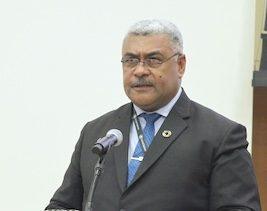Expert Voices
Small islands prepare for their big moment in 2024

You may be aware that Small Island Developing States (SIDS) contribute less than 1 per cent of global greenhouse gas emissions but face the worst effects of climate change. But have you heard that the UN will dedicate an entire conference in 2024 to help SIDS develop a path forward for their sustainable development? We asked UN DESA’s Sai Navoti to tell us more.
Small island nations are suffering some of the worst effects of climate change. What are some of the gravest challenges people in these nations are facing right now?
“Climate change is an existential threat to small islands, which are extremely vulnerable to sea level rise and extreme weather events like tropical storms, hurricanes, droughts and cyclones that can decimate communities and infrastructure. These crises are becoming more intense and interconnected, as climate-related disasters alone have almost doubled over the last 20 years. According to the World Bank, the annual cost of damages from natural disasters in SIDS can range between 1 to 8 per cent of their GDP—not something that these countries can afford as they still struggle with the economic effects of the COVID-19 pandemic.
And while it’s wonderful that SIDS are home to more than 40 per cent of the world’s coral reefs, which contribute to tourism as well as provide coastal protection, these reefs are threatened by the warming ocean, which in turn threatens all the different species that live in and around them. All of these problems, not to mention the remoteness of these islands, makes working together to solve them more difficult.”
In May this year, the international community will gather in Antigua and Barbuda for the Fourth SIDS Conference. Can you tell us more about this event?
“As SIDS are on the frontline of the climate challenge, it’s essential that we shine a spotlight on what island communities are dealing with and come up with a forward-looking pathway for their sustainable development. We in UN DESA are working to organize this fourth International Conference on Small Island Developing States in St. John’s, Antigua and Barbuda, from 27 to 30 May, where Member States will agree to this new path. The theme of the conference is “Charting the Course Toward Resilient Prosperity.” There will be eight plenary meetings, five interactive dialogues, and special events dedicated to engaging the private sector, civil society, youth and other important groups.”
What difference do we expect this conference will make for small island nations? How will it address some of the threats facing them?
“To confront their challenges, islanders need more support from the international community. People living in SIDS have ideas for solving their most pressing challenges, but they need investment and engagement to deliver them. Things like relieving SIDS’ debt burden, bolstering their resources for recovery and resilience measures, and developing more meaningful partnerships will help a lot.
As one example, SIDS also have some of the highest electricity costs in the world, due in part to their dependence on imported fossil fuels, but they also have tremendous potential to transition quickly to solar and wind energy if the funding is there. Let’s bring all these stakeholders to the table to consider new ways of working.
By having the fourth SIDS Conference in Antigua and Barbuda next May, we’re hoping to bring island countries together with potential partners to make concrete plans to ensure a bright future for everyone.”
What do you want the world to know about Small Island Developing States (SIDS) and the people who live there?
“People need to understand that, yes, SIDS countries are small, but collectively, we’re talking about more than 65 million people who live across more than 1,000 islands. In truth, it might be a more fitting name to call them “large ocean States” instead of small island States since SIDS control on average an area 28 times the size of their land mass, or 16.1 per cent of the world’s total exclusive economic zones.
People living in these countries are just like anyone who wants to live the best life they can and leave future generations well-equipped to maintain traditions and live their best lives. The best way for people in SIDS to do this is by ensuring the existence of their islands through adaptation and mitigation of the impacts of climate change, and by making sustainable use of ocean resources.”
Sai Navoti is the Chief of the SIDS Unit in UN DESA’s Division for Sustainable Development Goals. To learn more about the Fourth International Conference on Small Island Developing, browse the event website here.
Photo: UN DESA/P. Vasić
 Welcome to the United Nations
Welcome to the United Nations